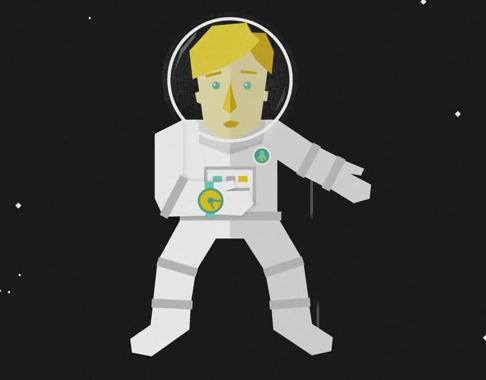Have you ever been floating in a swimming pool, all comfy and warm, thinking, "Man, it'd be cool to be an astronaut!
你是否曾經浮在游泳池里,感覺非常愜意,暖洋洋得,想著,“天啦,當一名宇航員太爽了!
You could float out in outer space, look down at the Earth and everything. It'd be so neat!"
你可以在外太空漂浮,俯瞰地球以及所有的一切。太棒了!“
Only that's not how it is at all.
但事實并不如此。
If you are in outer space, you are orbiting the Earth: it's called free fall.
如果你在外太空,你將會繞地球轉動,這叫做自由落體。
You're actually falling towards the Earth.
事實上,你正朝著地球下落。
Think about this for a moment: that's the feeling you get if you're going over the top of a roller coaster, going, like, "Whoa!"
想一下這種感覺:你坐上云霄飛車,即將爬過頂端時會有 “喔哦!”的驚嘆聲。
Only you're doing this the whole time you're orbiting the Earth, for two, three, four hours, days. Whatever it takes, right?
只是這回,你將一直這樣圍繞著地球轉,兩個小時、三個小時、四個小時或好幾天。無論多久都行,是吧?
So, how does orbiting work?
那么,怎么旋轉的呢?

Let's take a page from Isaac Newton.
讓我們請教一下牛頓吧。
He had this idea, a little mental experiment: You take a cannon, you put it on top of a hill.
他有這樣一個想法,也是一個小的心理實驗:你拿來一個大炮,把它擺在山頂上。
If you shoot the cannonball, it goes a little bit away.
如果你發射炮彈,它會射到不遠處。
But if you shoot it harder, it goes far enough so that it lands a little bit past the curvature of Earth.
但是如果你更猛地發射,它將“嗖”的飛到足夠遠,以至于它降落在地球表面的曲度以外。
Well, you can imagine if you shot it really, really, hard, it would go all the way around the Earth and come back— boom! — and hit you in the backside or something.
那么,想象一下,倘若你非常非常猛地發射,它也許會繞著地球飛行很遠,然后繞回來,砰一聲,撞到你后背或什么東西。
Let's zoom way back and put you in a little satellite over the North Pole of the Earth and consider north to be up.
讓我們把焦點拉回太空,并把你放在一個位于地球北極上方的小衛星里,假設北極方向為正向上。
You're going to fall down and hit the Earth.
你將會下落并撞向地球。
But you are actually moving sideways really fast.
然而,你實際正在非常快速地向一旁移動。
So when you fall down, you're going to miss.
所以,當你下落的時候,你將錯過正下方。
You're going to end up on the side of the Earth, falling down, and now the Earth is pulling you back in sideways.
你將最終移到地球的一邊,你往下落的同時地球把你往一旁拉。
So it's pulling you back in and you fall down, and so you miss the Earth again, and now you're under the Earth.
也就是說,你在下降時被地球往回拉,所以,你將再次錯過地球。這時,你已經移動到地球的下面了。
The Earth is going to pull you up, but you're moving sideways still.
地球往上拉你,但是你仍舊往一旁移動。
So you're going to miss the Earth again.
所以,你不得不再次錯過地球。
Now you're on the other side of the Earth, moving upward, and the Earth's pulling you sideways.
現在,你已經移動到地球的另一邊,正往上移動,并且地球正把你拉向一邊(垂直朝向地球)。
So you're going to fall sideways, but you're going to be moving up and so you'll miss.
也就是說,你在往一邊下落,但是,你正在快速地向上移動,所以你再次錯過地球。
Now you're back on top of the Earth again, over the North Pole, going sideways and falling down, and yep -- you guessed it.
現在,你再次回到了地球頂端,北極上方,往一旁移動,同時向下落,是的,你已經猜到了。
You'll keep missing because you're moving so fast.
你將一直錯過(地球),因為你正在飛速移動。
In this way, astronauts orbit the Earth.
正是如此,宇航員圍繞地球飛行。
They're always falling towards the Earth, but they're always missing, and therefore, they're falling all the time.
雖然他們一直朝地球下落,但他們卻一直錯過(落回地球),因此,他們一直在下落。
They feel like they're falling, so you just have to get over it.
他們也感覺自己在下落,你基本上只能接受這樣一種感覺。
So technically, if you ran fast enough and tripped, you could miss the Earth.
所以,技術上說,如果你跑得足夠快,突然絆一腳,你將脫離地球。
But there's a big problem.
但是,這里有個大問題。
First, you have to be going eight kilometers a second.
第一,你必須每秒跑8公里。
That's 18,000 miles an hour, just over Mach 23!
也就是每小時1萬8000英里,超過23馬赫(23倍音速)!
The second problem: If you're going that fast, yes, you would orbit the Earth and come back where you came from, but there's a lot of air in the way, much less people and things.
第二個問題:假設你能移動那么快,你將繞地球運動并且回到你的起點,但是一路上會有大量的空氣,當然,人和其他事物極少。
So you would burn up due to atmospheric friction.
所以,大氣摩擦將導致你燃燒至盡。
So, I do not recommend this.
因此,我并不推薦這樣做。











